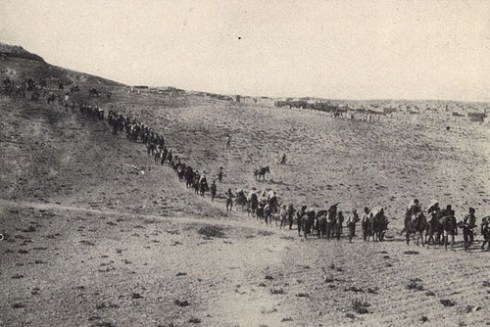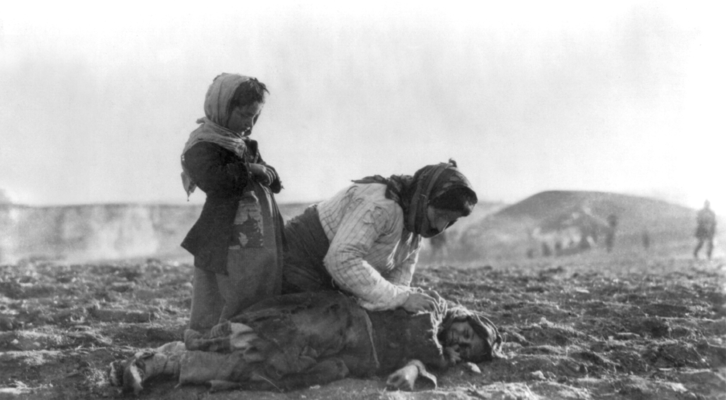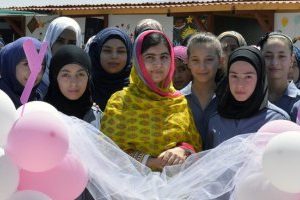“Neutrality helps the oppressor, never the victim!”
Holocaust survivor and Nobel laureate Elie Wiesel
Although some Armenians around the world were hoping that US President Barack Obama would keep his promise and recognize the Armenian Genocide, his statement was not surprising for many. President Obama like usual used the term “Medz Yeghern” in Armenian which means the “Great Crime”. In his statement the President said “Today we solemnly reflect on the first mass atrocity of the 20th century—the Armenian Meds Yeghern—when one and a half million Armenian people were deported, massacred, and marched to their deaths in the final days of the Ottoman Empire”. President Obama once again avoided using the word Genocide. This breaks a campaign promise he made in 2008, when he said “As a president, I will recognize the Armenian Genocide”. Over 40 US states recognize the genocide, including California, whose Governor Jerry Brown declared 24 April a state-wide “Day of Remembrance of Armenian Genocide“.

Armenians being deported towards the Syrian deserts, known as the “death march”
For Armenians, it’s very important to acknowledge the description of systematic massacres and the mass slaughter of their ancestors during the WWI as Genocide. First, the word Genocide was invented by Yale Professor Dr. Raphael Lemkin while trying to find a way to describe the mass slaughter of the Armenians in the Ottoman Empire. Furthermore, Dr. Lemkin is seen in this CBS News clip clearly stating “it happened to the Armenians.” The word, and Dr. Lemkin’s role in creating this word, is described in a New York Times piece titled Questions and Answers About the Armenian Genocide. Second, the word Genocide holds a legal term. That is after recognition there is reparation and compensation. The Armenian Diaspora many times raised the question of return of the confiscated property, including the territories drawn by US President Windrow Wilson.
Prior to the Russian Bolshevik Revolution in 1917, US had adopted the policy of neutrality. Thus, this granted her diplomats the freedom to report about the massacres and the deportation of Armenians, Assyrians, and Greeks. According to Henry Morgenthau, US ambassador to Turkey (1913-1916), “The real purpose of the deportation was robbery and destruction; it really represented a new method of massacre. When the Turkish authorities gave the orders for these deportations, they were merely giving the death warrant to a whole race; they understood this well, and, in their conversations with me, they made no particular attempt to conceal the fact.” Morgenthau in his book even claimed that the Turkish government planned and executed the destruction of the Armenian race. He explained; “I am confident that the whole history of the human race contains no such horrible episode as this. The great massacres and persecutions of the past seem almost insignificant when compared with the sufferings of the Armenian race in 1915.”
Peter Balakian in his book “The Burning Tigris” explains the humanitarian assistance provided by US missionaries and the Near East Relief to the Armenian orphans. If today the Armenian community survived and flourished in the Middle East, it was thanks to the effort of US humanitarian agencies.
As the Cold war heated up, relations NATO member Turkey were considered very important; which lead to increased US military aid to Turkey. Turkey was used as a buffer zone against Soviet expansion. So it was not surprising that although President Reagan mentioned the Armenian Genocide in his proclamation about the Holocaust in 1981 “Like the genocide of the Armenians before it…the lessons of the Holocaust must never be forgotten”, he did not support any official US recognition.
President George Bush also urged Congress members multiple times to reject a resolution recognizing the killings of Armenians in 1915 as “Genocide”, warning that it would damage US relations with Turkey. According to him, the resolution would do “great harm” to US-Turkish relations. According to the Guardian newspaper, many in the US feared for the crucial supply routes through Turkey to Iraq and Afghanistan, and the closure of Incirlik, a strategic air base in Turkey used by the US air force. In 2008, Barack Obama and US secretary Hillary Clinton pushed forwards the Armenian-Turkish protocols aiming the normalization of diplomatic relations between Armenia and Turkey. Taking into consideration the current regional events, the US needs Turkey more than any moment. Turkey plays a key role in solving the refugee crisis and influencing various Syrian opposition forces. Therefore, by recognizing the Armenian Genocide, the US may lose a strong ally in the region and threaten her regional interests.
On the other hand, the US has a moral duty to towards the future generations, and the victims of past atrocities, the courage to act today, regardless of political pressure. As a leading power, the US has a duty to prevent further genocides and mass killings. The US humanitarian response of the Yezidi massacres on Sinjar Mountain by ISIS was a clear example. Thus, theUS must officially recognize the Armenian Genocide and put humanitarianism above “realpolitik”. Being “neutral” in front of justice only serves the interest of the oppressed and encourages further crimes against humanity and civilizations.
The article was originally published at themodcon.com
Yeghia Tashjian holds a B.A. in political science from Haigazian University in Beirut, Lebanon. He is a Lebanese-Armenian political activist, researcher, blogger and the founder of the New Eastern Politics forum/blog. Currently, he is the regional officer of Women in War, a gender-based think tank and research assistant at Armenian Diaspora Research Center, Haigazian University, Beirut-Lebanon. You can follow the author on Twitter @yeghig.







